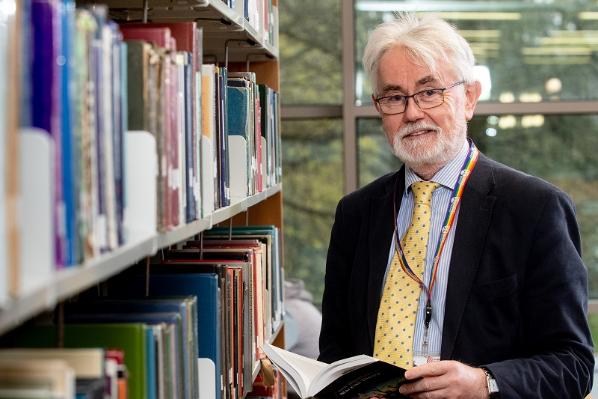BLOG: Gestetner to Office 365: Looking back on my time at Queen's
"It would have been beyond my imaginings in September 1979 that I would still be working at Queen's in 2021 and in a different discipline from Sociology where I started work."
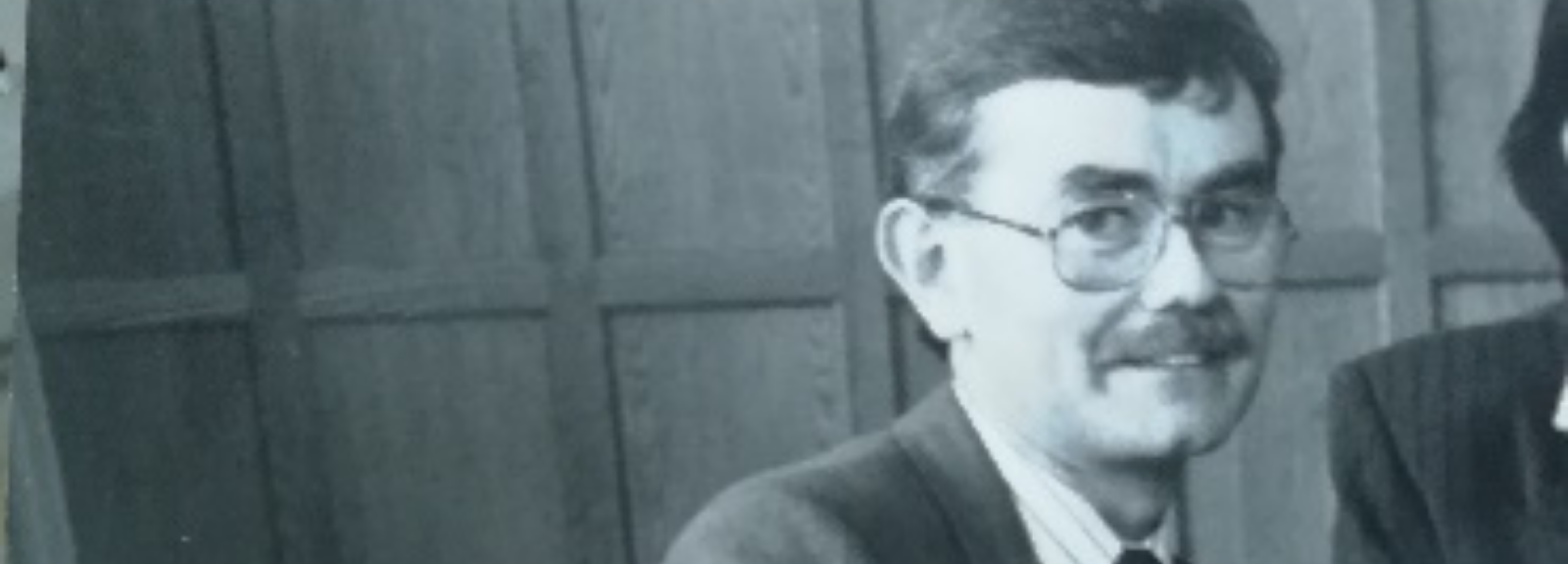
A blog by Patrick Brannigan, recently retired Manager: IT Training and Assessment Unit, IELTS Test Centre, ECDL Test Centre, Information Services Directorate
It would have been beyond my imaginings in September 1979 that I would still be working at Queen's in 2021 and in a different discipline from Sociology where I started work. Nor, when I graduated in 1977, did I expect to be taking daily coffee breaks with my lecturers two years later, on first name terms with each of them. Well, just to banish the myths, there was plenty of academic activity going on back in the days when academic staff elected the Dean and we had three terms in each academic year. When I came into Queen's there were no Schools, we had departments (academic and service). I have seen and been part of multiple re-organisations in my time at Queen’s.
Teaching and supporting research and teaching in Social Studies under Prof Bob Miller and the then Chair, and future PVC, Prof Roy Wallis was a great learning experience. As the most junior academic colleague, I found it fascinating to observe the diverse academic aspirations, outlooks and interactions.
As with many colleagues, there are great memories of the many students that you meet, teach and support. It is the serendipitous encounters that fascinate me. I bumped into a former student recently on the Strangford Ferry: he had done very well in his career, and there was a chuckle at the memory of me quietly helping him sort out Tables in SPSS1 when he had just started work in a big corporate, way back in time.
The use of computers (method of data input shown) led me to consider a change in direction after a few years and, while still working, I took on the Masters in Computer Science, part-time. It was quite a challenge returning to study after 10 years; and hard work too. Mind you, my subsequent boss said he found the course easy; but then he was the one who had already been dabbling in programming and those things called microcomputers.
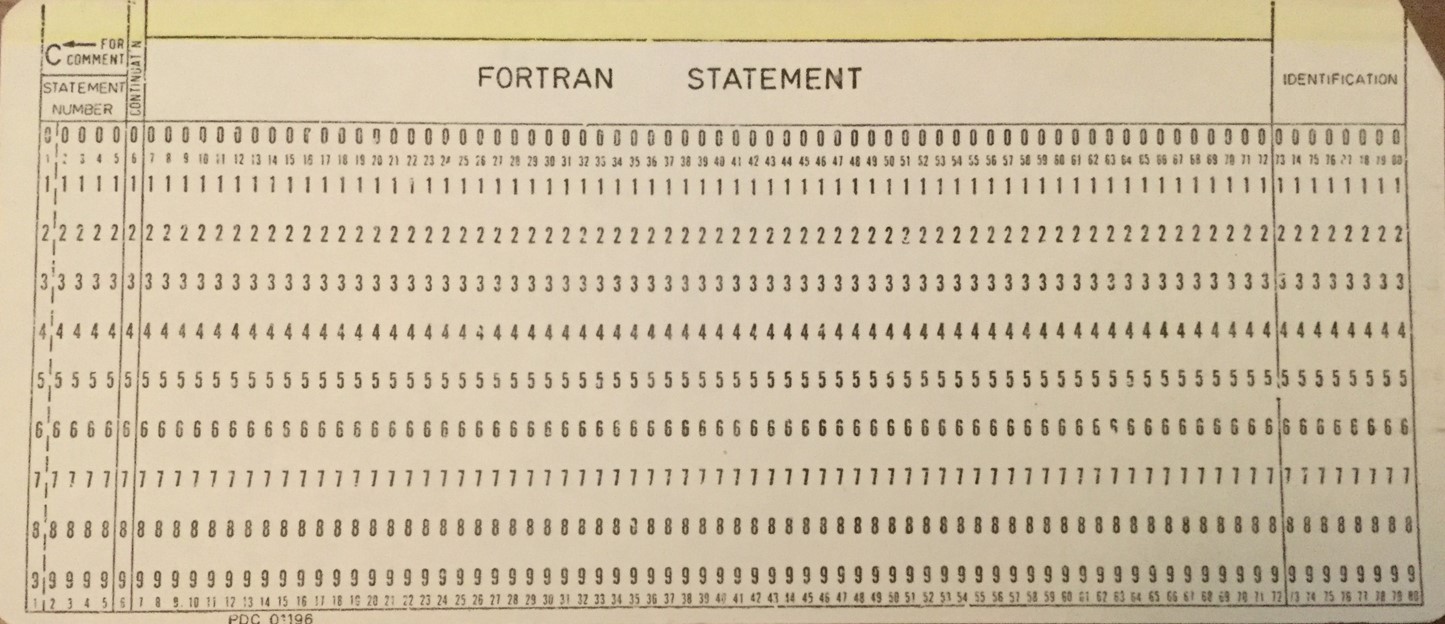
Example of Computer Card - how we used to put data and instructions into computers, 1970s/80s.
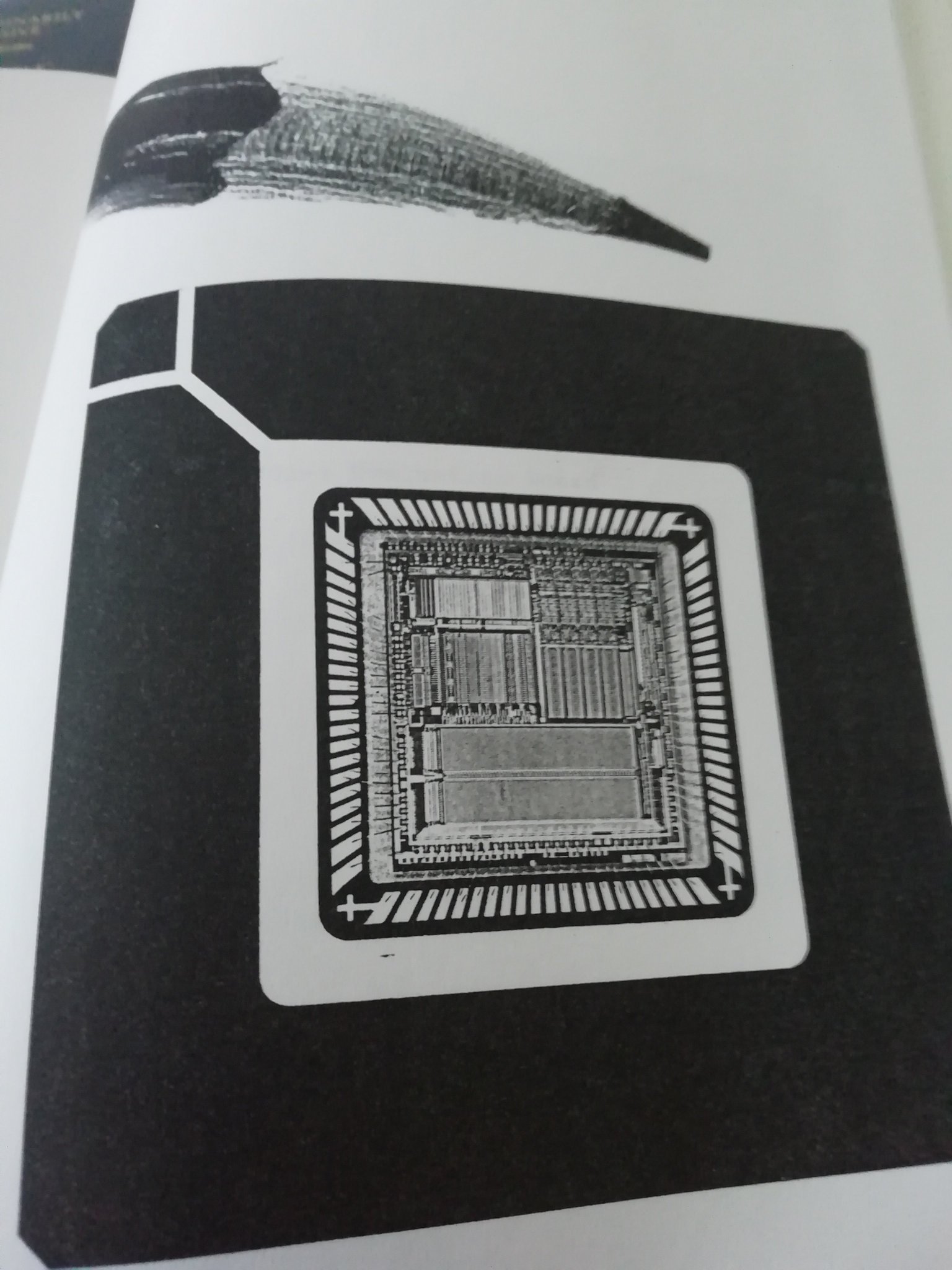
Transputer chips were used in an array for high-speed processing. Subject of my dissertation under Dr Peter Milligan. Photo 1986.
The Masters was my ticket into a job as a 'Programmer' in the then Computer Centre.
Initially, my job was in the Advisory Service supporting colleagues with real computer problems as opposed to theoretical programming tasks and futuristic computer chips on the MSc (see image of Transputer). This is where I got to see the wider university, the scope and scale of what colleagues do across the many disciplines and departments. A great way to learn about computers is when you are challenged by diverse users who ask you to solve their problems. Learning on the job also includes developing your understanding of how to provide a service with clarity and good humour. When people put you under great pressure about an issue or a service the key thing is to stay calm and manage the pace of the interaction. Colleagues’ pressure might be because of a deadline or because they are really struggling to conquer the task in hand. And this happens to us all at all levels.
My visionary boss, Fred McBride, had other plans for me and several other colleagues: Prof McBride working with Profs Ken Bell and John Gardner were leading on initiatives and innovations to support the use of computers in teaching, and supporting the development of digital skills in our students. One of the highlights of this period was the fantastic staff we recruited under nationally funding projects (including ITTI2, TLTP3).
One of our goals was to encourage our teaching staff to consider using computers to teach their subjects and support others who were already doing this. Ideally, this was easier when you showed them examples in their own discipline, but this was not always possible. We were commissioned by the Consumer Council to teach P7 pupils about their consumer rights and develop the package for BBC Micros. An unexpected outcome was the enthusiasm this product engendered in teaching colleagues, encouraging them to think of computer-based learning (CBL) in their own discipline.
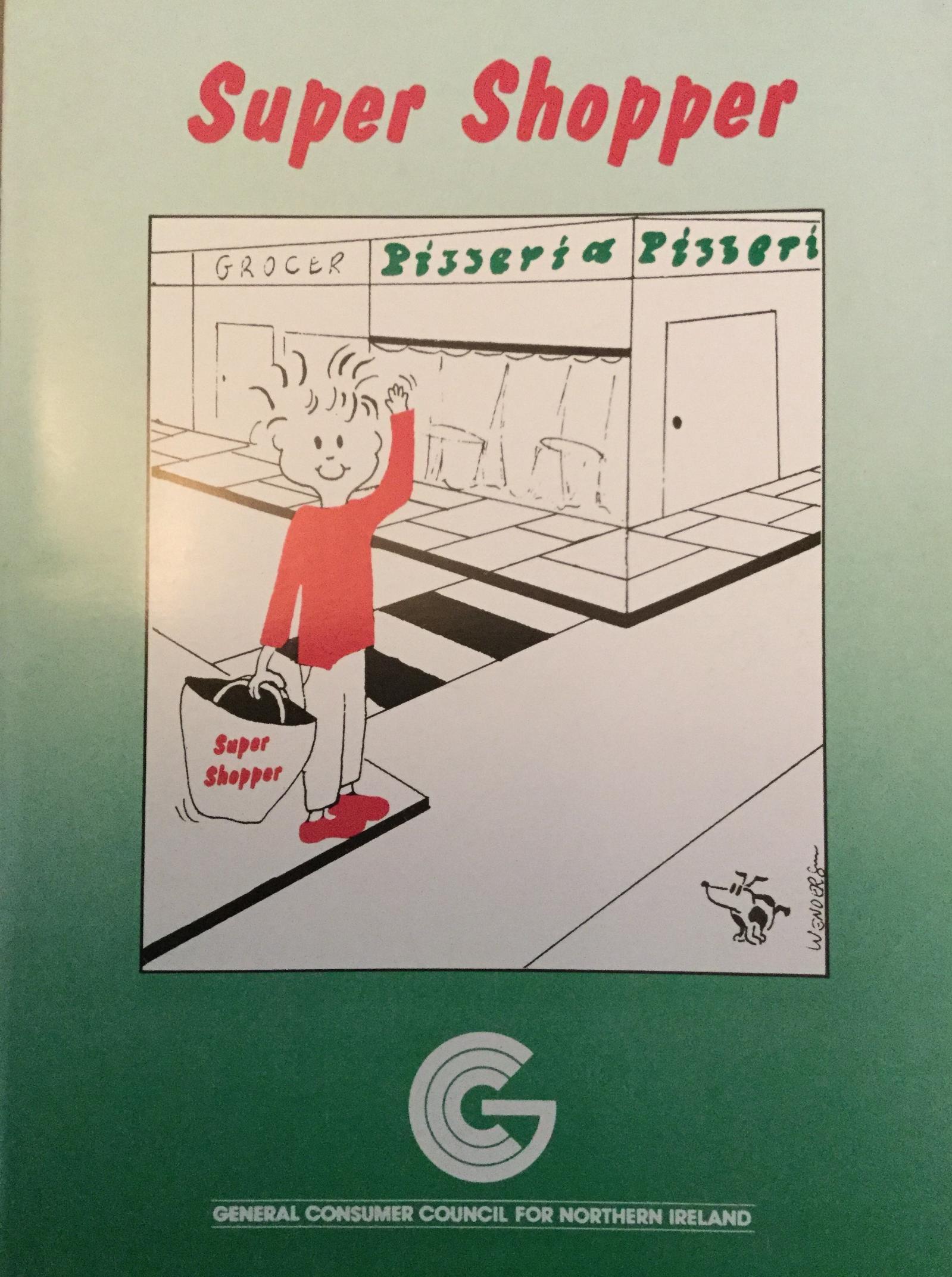
Super Shopper leaflet, 1989. Cartoons in the package by Wendy Rutherford.
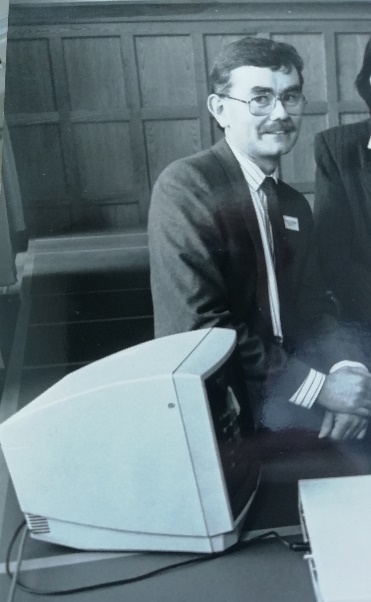
Launch of Super Shopper in the Canada Room, 1989.
Work continued at pace to produce CBL materials across the disciplines but coupled with that we started a Masters in Computer Based Learning. We had been showcasing our work and working with colleagues to publish in the area so a Masters was a logical step. My role shifted to course administrator, exams officer and a module lead. Cue a different cohort of students into my life: seasoned and new teachers, and recent graduates (funded by the European Social Fund). We used ISDN telephone lines and the 'Net to teach simultaneously from Belfast to the then Queen's Armagh campus and our Omagh FE College hosted facility. It is amazing how resonant that experience of distant working and teaching is now for all our students and staff.

Paddy in College Park East, c.1995.
In the mid-90s, Medicine asked for my input into their Masters course in Clinical Education, and I have been teaching the module (Technology and Education) until recently - I am not sure if too many of us can say that we taught the Dean. It has been fascinating teaching many clinicians over that time.
Sometimes in my career it has been wise colleagues who have encouraged and supported me in going for new challenges; I was fortunate to get the opportunity to manage my own unit, the IT (Information Technology) Training Unit. Never static, never the same, this role has grown since the earlier days of us providing training in Fortran programming (then C++) plus training staff and research students to make best use of the desktop applications (in the early 2000s, IT was not as extensively used or intrinsic as it is now). Now there is quite a range of applications that staff need to know and the team are working to get colleagues to see the potential of the more powerful of the Office 365 applications. The central tenet of our work is to enable staff - through consultancy and training - to fully exploit IT so that they can be more effective in their work. Great trainers have passed through the unit and the fantastic current trainers did a superb job supporting staff and students make the transition to Teams last year (that support continues as the functionality in Teams improves).
We have for years been offering an internationally recognised IT qualification for staff and students – it is my contention that it is something colleagues could explore if they have not already considered or attained the accreditation. Staff and Students have found the ECDL4 invaluable in acquiring better IT skills. When any of us show students or staff how easy it is to create a table of contents for a substantial document, those present who have completed their theses groan at the amount of time and energy they could have saved. This applies to other desktop applications that we use every day. Have we changed our working practices to fully exploit IT? Whether we played our part is for others to determine, I reckon we did and still do. But it is a question we as an organisation need to continually explore.
As a manager you get asked to take on additional responsibility that you never anticipate, including managing other units as an interim or on a continuing basis – this is where you need to be a good listener and rely on the staff with their expertise. This applies to our current IELTS5 test centre.
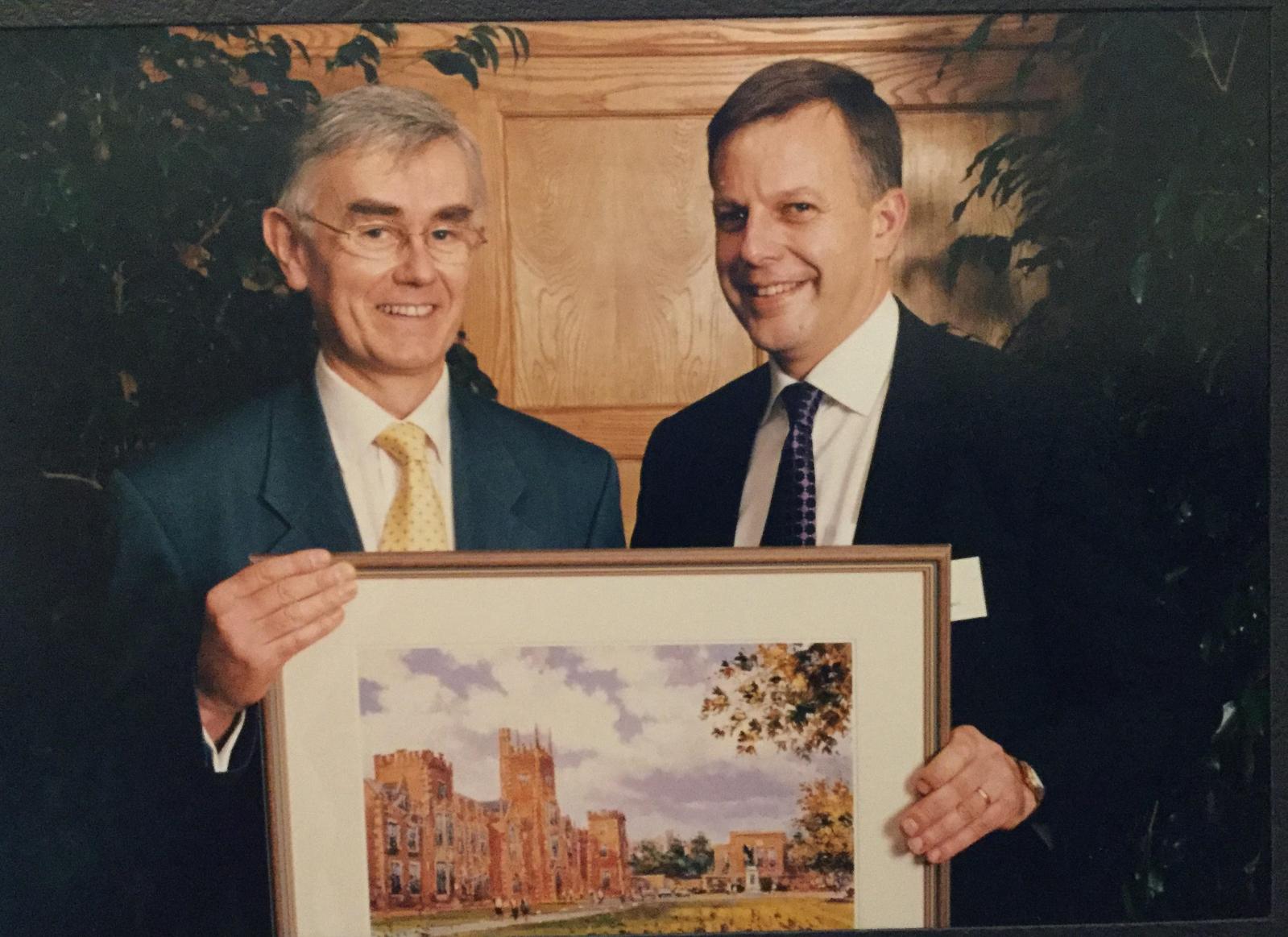
With the then Vice-Chancellor, Professor Gregson at the celebrations for staff working 25 years at Queen’s, 2004.
Every year we introduce all new students to our IT facilities and the skills they require to progress - a programme initially requested in the late 90s by the (then new) School of Nursing. This is a programme we run in close collaboration with Library colleagues. The subject librarian being the person the students need to know, and we then step gracefully into the background.
I also greet, and describe our IT services to all new staff, and guide to them to the possible sources of support for their IT requirements. I cannot remember when I have not been communicating with new and existing colleagues and students or representing their interests and feeding back on emerging systems. On a management course, I discovered a talent I had used for years but had not fully realised that I have - that is where I plant the seed of ideas or proposals in people's minds - there are a lot of teachers in my family! This requires patience – something I admit has evolved over time.
In my time at Queen’s, I have been fortunate in being mentored by good line managers; they were exacting, but supportive. And as a manager I find it stimulating and challenging to get the balance right between directing, encouraging, supporting, and, very importantly, letting people use their own initiative. As both a manager and an assessor, I have learnt that constructive feedback is essential; giving good feedback is a skill that evolves over time, after many interactions with colleagues and students. It is maybe not a surprise that the exploitation of Outlook was a topic I chose to train in. Having replaced the memo we had a lot to learn about email etiquette and that need to review etiquette is still pertinent in the context of meeting scheduling, meeting management, and the use of Chat.
The social side of work is important and looking back I still regret that we do not now have a facility analogous to the Staff Common Room where often work was reflected upon and issues clarified. Other ways to support each other have continued, at local level (our own division is good at this) and across the University – these are vital at present. Recently I have had fun being the MC at the ever-popular Information Services Coffee Morning with its loads of prizes and mince pies.
In 2016 a very unexpected experience came my way when I got the chance to join the Staff Choir led by the very talented Una McCann and which was started and supported by the Wellbeing team. Not having to audition was a big draw. Little did I know how much of an influence it would have on me.
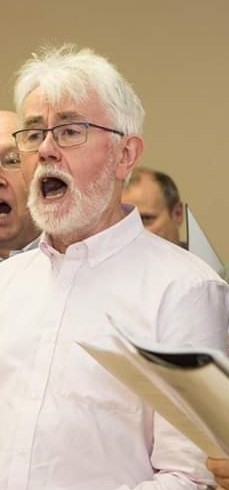
Paddy singing during St Patrick's Day preparations, with Queen's and Ormeau choirs, 2018.
I had not sung in a choir since School, but this was nothing like School choir. It is fun and inspiring - a marvellous way of dealing with stress. You come away from rehearsals with a fresh eye on any difficulties you are dealing with. And you get to know even more colleagues; it is a great equaliser. We Basses provide a constant source of merriment to the wonderful Sopranos, as we seem to never sway in the same direction as the other choir members (or so they say).
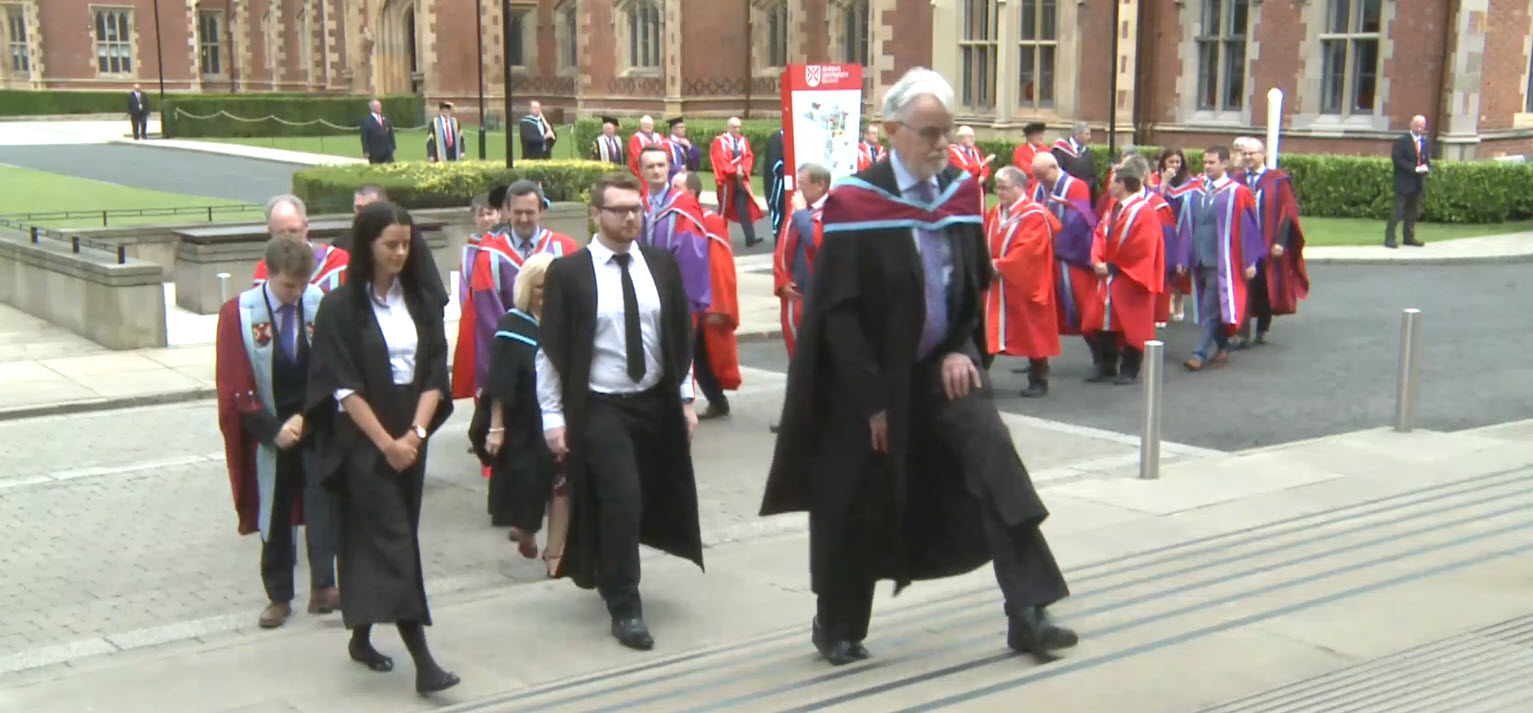
Leading Academic Procession, 2019 – this was the fast procession or so my colleagues doing the video work told me.
Thank you to the Internal Communications team for giving me this opportunity to share some of my experiences at Queen's, to say goodbye and wish everyone well. I am sad to be leaving Queen’s after all this time, it has been a big part of my life. I plan to continue to connect with the many friends I have made. I am leaving behind colleagues and students who are doing sterling work in hugely demanding circumstances.
Staff can connect with Paddy via Twitter at: @patrickjmb.
1 SPSS – Statistical Package for the Social Sciences
2 ITTI – Information Technology Training Initiative
3 TLTP – Teaching and Learning Technology Programme
4 ECDL – European Computer Driving Licence
5 IELTS – International English Language Testing System
